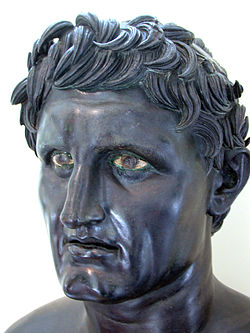
Back Diadochen ALS ملوك طوائف الإسكندر Arabic Diádocos AST Diadoxlar Azerbaijani Дыядохі Byelorussian Диадохи Bulgarian Diadoked Breton Dijadosi BS Diàdocs Catalan Diadochové Czech
This article needs additional citations for verification. (June 2020) |


The Diadochi (/daɪˈædəkaɪ/ dy-AD-ə-ky;[1] singular: Diadochos; from Greek: Διάδοχοι, translit. Diádochoi, lit. "Successors", Koinē Greek pronunciation: [diˈadokʰy]) were the rival generals, families, and friends of Alexander the Great who fought for control over his empire after his death in 323 BC. The Wars of the Diadochi mark the beginning of the Hellenistic period from the Mediterranean Sea to the Indus River Valley.
The most notable Diadochi include Ptolemy, Antigonus, Cassander, and Seleucus as the last remaining at the end of the Wars of the Successors, ruling in Egypt, Asia-Minor, Macedon and Persia respectively, all forging dynasties lasting several centuries.[2]
- ^ Wells, John C. (2008). Longman Pronunciation Dictionary (3rd ed.). Longman. ISBN 978-1-4058-8118-0.
- ^ Chisholm 1911, p. 600.
© MMXXIII Rich X Search. We shall prevail. All rights reserved. Rich X Search